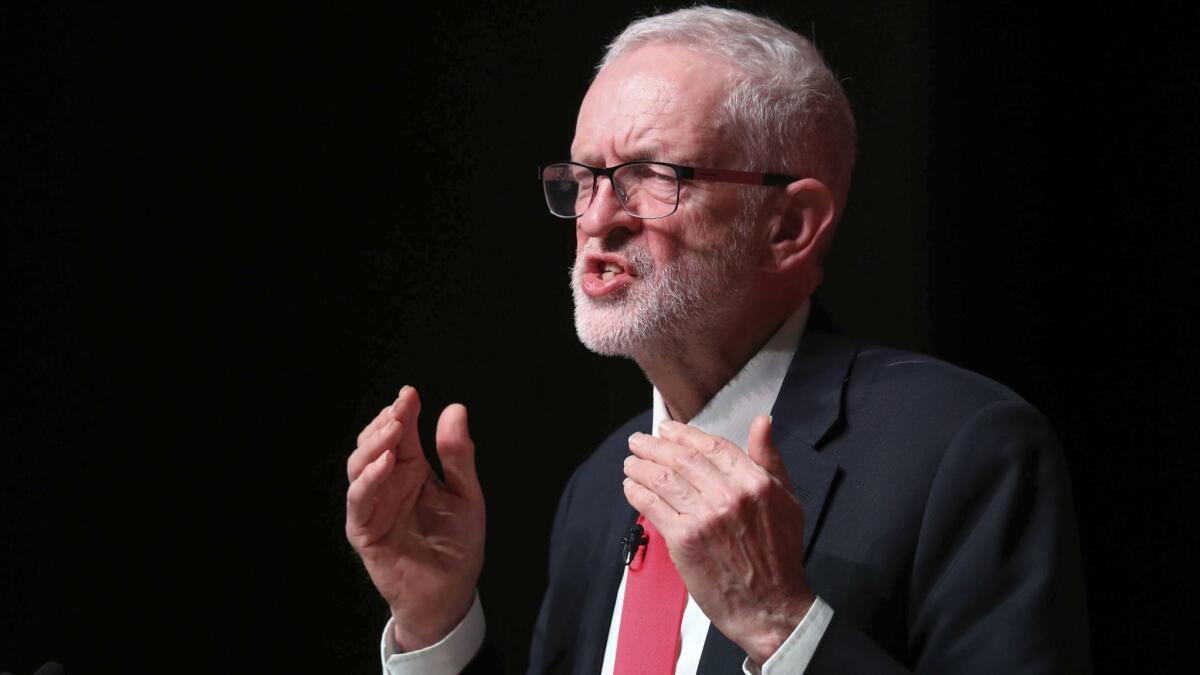Allegations of anti-Semitism rock Britain’s Labor Party

Reporting from London — It was once considered the British party that stood up to racism and inequality. But today, the Labor Party is at risk of splitting over an anti-Semitism crisis with which it seems unable to come to grips.
For several years now, the main British opposition party has faced a steady flow of allegations that some of its parliamentarians and other members were exhibiting openly anti-Semitic behavior.
In February, eight lawmakers quit to form an independent group of parliamentarians, stating that the failure to bring this issue under control was one of their key concerns.
Last week, Britain’s Equality and Human Rights Commission announced that the party may have “unlawfully discriminated against people” based on their ethnicity and religious beliefs.
It marked the first step in what could turn into a formal investigation of how the party has handled complaints about anti-Semitism.
“One anti-Semite in our party is one too many,” a party spokesman said in response, promising to cooperate with the investigation fully.
But many Jewish people remain critical of the speed and transparency with which complaints are being dealt with by the party and in the nation itself.
“I would say there’s a link between what’s happening within the [Labor] party and the rise of anti-Semitic crime in the country,” said Gideon Falter, 35, who heads the Campaign Against Antisemitism. “It emboldened anti-Semites outside the Labor Party, and within it.”
The number of hate crimes has risen dramatically in Britain in recent years, with the Muslim community still the greatest target. Anti-Semitic incidents, tracked for the past 35 years, reached a record high last year with 1,652 episodes reported, according to the Community Security Trust. It marked the third consecutive annual increase and a roughly threefold rise since 2013.
One recent poll showed that nearly 40% of Britain’s more than 250,000 Jews would seriously consider leaving if Labor Party leader Jeremy Corbyn became prime minister.
Rising anti-Semitism is not unique to Britain and has also cast a pall over U.S. politics.
Soon after taking office in 2017, President Trump was faced with how to react to the deadly demonstrations in Charlottesville, Va., at which neo-Nazis chanted, “Jews will not replace us.” Trump’s response was that there were “fine people, on both sides” of the confrontation.
Last week, Trump claimed that the Democratic Party was anti-Jewish and anti-Israel as he blasted a House-passed resolution, proposed by Democrats, to stem controversy over remarks by freshman Rep. Ilhan Omar (D-Minn.) that many criticized as anti-Semitic.
Falter was born and raised in England and, until recently, never really questioned his future here. But as a Jewish man, he feels it is becoming an increasingly unsafe place for members of his faith and cites one reason above all others: The election of Corbyn as Labor Party leader in 2015.
Falter is among a growing number of British people who allege that Corbyn has failed to adequately speak out on the issue and not only root out perpetrators, but swiftly expel them from the party.
Corbyn, an internationally focused socialist and vocal supporter of Palestinian rights, has campaigned throughout his career against Western imperialism and aggression. His allegiances with militant groups Hezbollah and Hamas, whom he controversially referred to as “friends,” have led to accusations of being a “terrorist sympathizer.”
Although Corbyn ordered an independent inquiry into anti-Semitism in his party in 2016, critics say it was ultimately compromised and contend that Corbyn’s reticence to speak up more forcefully against those who express anti-Zionist views is borne out of a desire not to alienate himself from those on the left whom he is ideologically aligned to.
But this also makes him an easy target for those on the right who see his failure to lead on this issue as deeply troubling.
Falter believes Corbyn is turning the Labor Party into a place where “racists can be at home.
“I personally feel very worried about my future in this country. One of the two political parties is infected with anti-Semitism,” he said. “It’s totally terrifying.”
Britain’s Labor Party has repeatedly said it is committed to tackling the issue, but complaints continue to mount.
Records show that between April 2018 and January 2019, the party received 673 complaints alleging acts of anti-Semitism by its members.
Luciana Berger, a young Jewish member of parliament who was one of those who recently quit the Labor Party and joined the independent group, said she has received a barrage of hate mail and verbal bullying. One online troll was sent to prison after calling her “Jewish scum.”
Last month, video published of Labor lawmaker Chris Williamson added fuel to the fire for those who believe Corbyn is either complicit through complacency or privately anti-Semitic himself.
The close ally of Corbyn was caught on camera telling local Labor activists that the party had “given too much ground” and been “too apologetic” over the anti-Semitism issue and that Labor was being “demonized as a racist, bigoted party.”
He later said he deeply regretted his comments and was suspended from the party.
“It is impossible to overstate the damage that the anti-Semitism accusations are having on the Labor Party,” said Matthew Flinders, director of the Sir Bernard Crick Center for the Public Understanding of Politics at the University of Sheffield.
The Jewish Labor Movement, an organization that has long been affiliated with the party, recently held a lengthy debate over whether it should cut ties, and the leader of the Labor Party in the House of Lords, Toby Harris, said in an open letter to Corbyn published Friday that the human rights probe was a “political failure.”
The last time that the watchdog organization took action against a political party was during an investigation of the far-right British National Party regarding its “whites-only” membership policy.
“For the Labor Party to be in this position is nothing short of humiliating and a matter of great shame,” Harris said.
Corbyn backers counter that the issue has been overblown and say it is an attempt by rival politicians and right-wing news organizations to discredit their leader, who has presided over a huge groundswell in party membership, especially among younger voters won over by his promise to prioritize education, welfare and healthcare.
Supporters say Corbyn stands by his principles, but some have soured over what they see as a failure of leadership over anti-Semitism as well as the chief crisis facing the country: how to deal with Brexit as the March 29 deadline when Britain is due to formally leave the European Union looms.
“I don’t think this is a major embedded problem that has polluted the whole of the party membership and ranks. It’s a relatively tiny proportion of Labor Party members that hold some incredibly worrying views,” Flinders said. “What I don’t understand is why Jeremy Corbyn hasn’t made a very clear and strong public statement about his view and the Labor Party’s view on the issue. Address this quickly and effectively -- basically show some leadership.”
Boyle is a special correspondent.
7 quit Britain’s Labor Party, citing Brexit and anti-Semitism »
More to Read
Sign up for Essential California
The most important California stories and recommendations in your inbox every morning.
You may occasionally receive promotional content from the Los Angeles Times.










